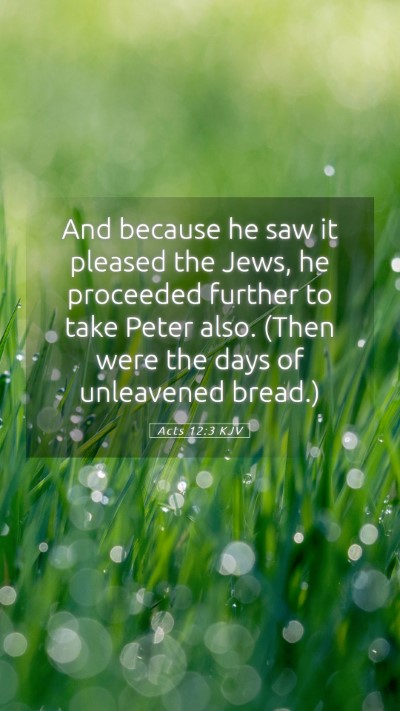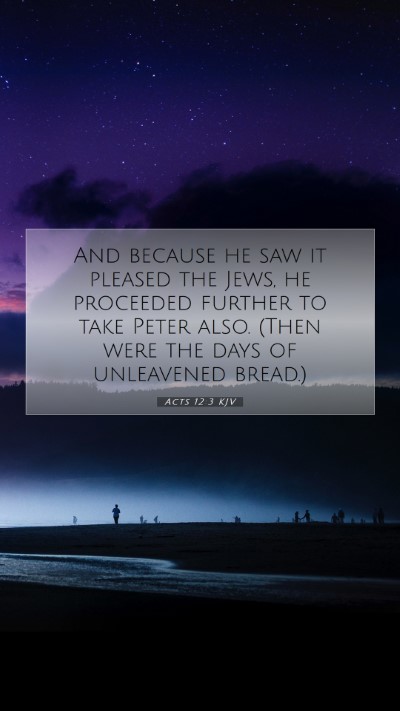Old Testament
Genesis Exodus Leviticus Numbers Deuteronomy Joshua Judges Ruth 1 Samuel 2 Samuel 1 Kings 2 Kings 1 Chronicles 2 Chronicles Ezra Nehemiah Esther Job Psalms Proverbs Ecclesiastes Song of Solomon Isaiah Jeremiah Lamentations Ezekiel Daniel Hosea Joel Amos Obadiah Jonah Micah Nahum Habakkuk Zephaniah Haggai Zechariah MalachiActs 12:3 Meaning
What is the meaning of Acts 12:3?
And because he saw it pleased the Jews, he proceeded further to take Peter also. (Then were the days of unleavened bread.)
Acts 12:3 Bible Verse Meaning
Understanding Acts 12:3
In Acts 12:3, we see a crucial moment in the life of the early church, where King Herod Agrippa began to persecute the followers of Christ. This verse reads:
"And when he saw that it pleased the Jews, he proceeded further to take Peter also. Then were the days of unleavened bread."
Bible Verse Meanings
This verse is rich in meaning and interpretation, and scholars have provided insights into its significance and context.
- Matthew Henry: Henry comments on the political motivations behind Herod's actions, suggesting that they were aimed at gaining favor with the Jews by targeting the Christians. This illustrates the conflict of interests during this time, and how political agendas can influence religious persecution.
- Albert Barnes: Barnes emphasizes the timing of Peter's imprisonment being during the Feast of Unleavened Bread, which serves to highlight the tension between Jewish customs and the early Christian movement. He notes that Herod's actions were not just random but calculated to resonate with the Jewish people.
- Adam Clarke: Clarke offers a view on the implications of this persecution, indicating that it foreshadows the challenges faced by the apostles and the early church. He points out the strategic targeting of Peter, one of the most prominent leaders of the Christian faith, signaling a serious threat to the movement.
Bible Verse Interpretations
To grasp the full impact of Acts 12:3, it is essential to consider the historical and spiritual layers embedded in the text.
- Historical Context: During this period, the apostles faced intense opposition. The mention of the "days of unleavened bread" links the text to the Passover, a significant event in Jewish history, indicating that the events were occurring in a context that heightens their gravity.
- Political Dynamics: Herod's decision to arrest Peter was likely a political maneuver intended to solidify his power and please the Jewish leaders. This reflects the broader theme of political persecution of Christians that would continue throughout church history.
- Spiritual Warfare: The act of arresting Peter can also symbolize the struggle between the forces of evil and the advancing kingdom of God, reminiscent of the spiritual battles described throughout the New Testament.
Scripture Analysis
Acts 12:3 serves as a pivotal moment in the narrative of the early church, revealing the increasing challenges they faced as they spread the message of Jesus.
Significance of Peter's Imprisonment
Peter's imprisonment demonstrates not just the danger of speaking the truth of the Gospel but also God's providential care over his people. The events that follow show how God intervenes despite such dire circumstances.
Understanding Scripture
Here are some key insights that can help in understanding this verse:
- Persecution often arises from jealousy and fear of the growing influence of believers.
- Timing is significant in biblical events; the Feast of Unleavened Bread marks a sacred time that amplifies the seriousness of Peter's persecution.
- The early church was born into a hostile environment, challenging believers to cling tightly to their faith amidst trials.
Related Bible Cross References
- Matthew 10:17-21 - Jesus foretells persecution of His disciples.
- Acts 5:17-29 - The apostles face persecution for preaching in Jesus' name.
- Acts 8:1-3 - Saul's persecution of the church leads to the scattering of believers.
Conclusion
Acts 12:3 provides critical insights into the early church's struggles and the importance of understanding the broader implications of persecution against believers. This exploration can enhance one's Bible study insights and deepen one’s understanding of Scripture. By studying such passages, groups can better grasp the challenges faced by the early Christians and apply these lessons to contemporary faith challenges.


